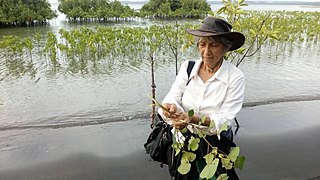
Ziconotide, sold under the brand name Prialt, also called intrathecal ziconotide (ITZ) because of its administration route, is an atypical analgesic agent for the amelioration of severe and chronic pain. Derived from Conus magus, a cone snail, it is the synthetic form of an ω-conotoxin peptide. It is 1,000 times as powerful as morphine.

A conotoxin is one of a group of neurotoxic peptides isolated from the venom of the marine cone snail, genus Conus.
Baldomero Olivera is a Filipino chemist known for discovery of many cone snail toxins important for neuroscience. These molecules, called conotoxins, led to a breakthrough in the study of ion channels and neuromuscular synapses. He discovered and first characterized E. coli DNA ligase, a key enzyme of genetic engineering and recombinant DNA technology.

Bienvenido F. NebresS.J. is a Filipino scientist, mathematician, and a Jesuit priest who was the longest-serving university president of the Ateneo de Manila University. He succeeded Joaquin G. Bernas in 1993, and served as University President until 1 June 2011. He currently sits as a member of the board of trustees of Georgetown University, Regis University, St. Edward School Foundation, Inc., the Asian Institute of Management, and other colleges and universities in the Philippines. He is also a member of the board of directors of Philippine Long Distance Telephone Company, and is currently chairman of the Synergeia Foundation. He was also Provincial Superior of the Society of Jesus in the Philippines.

Cone snails, or cones, are highly venomous sea snails of the family Conidae.

Caesar Aya-ay Saloma is a professor of the National Institute of Physics (NIP) at the University of the Philippines College of Science and a member of the National Academy of Science and Technology.

Science and technology in the Philippines describes scientific and technological progress made by the Philippines and analyses related policy issues. The main agency responsible for managing science and technology (S&T) is the Department of Science and Technology (DOST). There are also sectoral councils for Forestry, Agriculture and Aquaculture, the Metal Industry, Nuclear Research, Food and Nutrition, Health, Meteorology, Volcanology and Seismology.

The contryphans are a family of peptides that are active constituents of the potent venom produced by cone snail. The two amino acid cysteine residues in contryphans are linked by a disulfide bond. In addition, contryphans undergo an unusual degree of post-translational modification including epimerization of leucine and tryptophan, tryptophan bromination, amidation of the C-terminus, and proline hydroxylation. In the broader scheme of genetic conotoxin classification, contryphans are members of "Conotoxin Superfamily O2."

Dr. Josette T. Biyo is a Filipino educator and former executive director of the Philippine Science High School System. She has received international recognition for her contributions to science and education.

Conus victoriae, common name the Queen Victoria cone, is a species of sea snail, a marine gastropod mollusk in the family Conidae, the cone snails and their allies.
Adelina Adato Barrion was a Filipino entomologist and geneticist whose extensive contribution to the study of Philippine spiders earned her the moniker "Asia's Spider Woman," although she also contributed significantly to the study of other species, and to the study of genetics in general.
Conantokins are a small family of helical peptides that are derived from the venom of predatory marine snails of the genus Conus. Conantokins act as potent and specific antagonists of the N-methyl-D-aspartate receptor (NMDAR). They are the only naturally-derived peptides to do so. The subtypes of conantokins exhibit a surprising variability of selectivity across the NMDAR subunits, and are therefore uniquely useful in developing subunit-specific pharmacological probes.
Leconotide is an ω-conotoxin peptide isolated from the venom of Conus catus which is under investigation as an analgesic drug for the treatment of pain conditions.

Alfredo Mahar Francisco Amante Lagmay is a Filipino geologist. He is executive director of Project NOAH and a professor at the National Institute of Geological Sciences of the University of the Philippines Diliman.
Luz Oliveros-Belardo was a Filipina pharmaceutical chemist, honored with the National Scientist of the Philippines award by the Philippine government in 1987.

Jurgenne Honculada-Primavera is a widely cited Filipina marine scientist. For her research in mangrove ecosystem conservation she was honored as one of Time magazine's Heroes of the Environment for 2008. She was inducted into the National Academy of Science and Technology (NAST) in 2015.

Mandë Holford is an associate professor in chemistry at Hunter College with scientific appointments at the American Museum of Natural History and Weill Cornell Medical College. Her interdisciplinary research covering 'mollusks to medicine' spans chemistry and biology and aims to discover, characterize, and deliver novel peptides from venomous marine snails as tools for manipulating cellular physiology in pain and cancer.
Gemma Teresa Narisma was a Filipina researcher who served as the executive director of the Manila Observatory in the Philippines and Head of the Regional Climate Systems programme from 2017 to 2021. Narisma was also an associate professor of the Physics Department at the Ateneo de Manila University. She was an author of IPCC Sixth Assessment Report Working Group I.
Dolores A. Ramirez is a Filipino geneticist. She specializes in plant breeding and plant cytogenetics. She was named a National Scientist of the Philippines in 1998.

Mudjekeewis Dalisay Santos is a Filipino fisheries scientist and marine biologist who is Scientist IV at the National Fisheries Research and Development Institute (NFRDI). In July 2018, he was elected and conferred as an academician member of the National Academy of Science and Technology of the Philippines (NAST-PHL). He is also the president of the Philippine Society in Biochemistry and Molecular Biology since 2022. His fields of interest in fisheries science are genetics, resource assessment, aquatic biodiversity, biotechnology, climate change adaptation, and policy.












